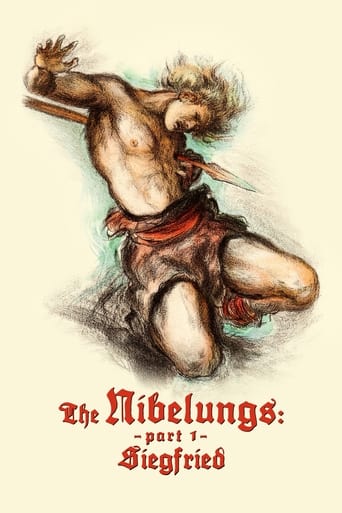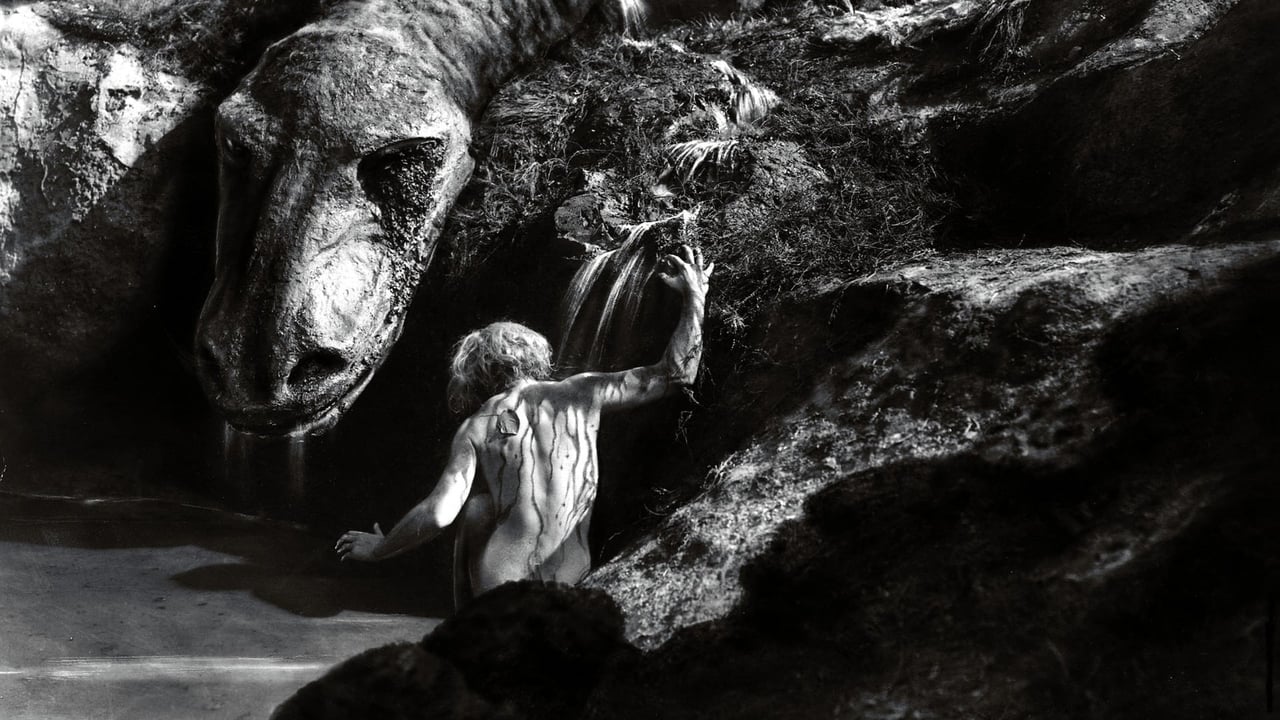dlee2012
Having long been familiar with Lang's early German silent work (I watched Metropolis and Die Frau im Mond as an adolescent), I was eager to experience Die Nibelungen. I was familiar with the narrative, having read an English prose translation of the Nibelungenlied during my student days. It is from the poem, rather than Wagner's opera cycle, that Lang wisely chooses to source most of his material.Fantasy has never been my favourite genre but the result here of the marriage of the great director and the great source material is simply stunning. The greatest achievement, to my mind, is that it manages to balance the epic with the personal making this journey through vast sets an emotional one. Even though the characters as written are largely one dimensional, the actors and actresses manage to overcome this and the absence of dialogue to make them sympathetic, rounded figures.Much has been written about the grandiose sets and the way they foreshadow Hitler's ideological understanding of architecture. Irrespective of that, they work in providing scale to the story. A petty tribal dispute becomes an epic story which will impact on the course of European history.Nevertheless, with regard to politics, origin myths are extremely powerful and have enormous power to shape a people. The Romans were very much formed by the story of the clash between Romulus and Remus, whilst the ancient Israelites would not have been so distinctive without the powerful, strikingly different story found in Genesis that contrasted so sharply from the myths of their neighbours. Likewise, as a story at the very foundation of the German character, this myth should be treated with caution. Here duty and loyalty take precedence over all other virtues, including compassion and justice, the female characters are burning for vengeance, most disturbingly, warriors are depicted in an heroic light. Of course, these are all traits the Nazis would exalt. It is to the enormous credit of modern-day Germans that they have shed most of these traits so I wonder to what degree the the Nibelungenlied still resonates with them.Finally, the film features a wonderful nature/season motif, which climaxes with the shot of the bush transforming into a skull. These tribes-people are slowly evolving into Christians yet they remain close to the pagan/nature world at this stage of the Dark Ages.Overall, this film has brilliant sets, cinematography, acting and motifs but I feel that it does to some extent foreshadow the dreadful events that were soon to occur. It should act as a warning to young nations like the Australia, of the dangers of an origin story that seeks to foolishly glorify events like Anzac Day.Nevertheless, politics aside, this is a stunning film for its technical achievements, huge scale and sheer emotion.
Claudio Carvalho
Canto 1: How Siegfried Slayed the Dragon: Siegfried (Paul Richter), the son of King Siegmund, forges a sharp sword and hears stories from the locals about Princess Kriemhild (Margarete Schön). He decides to go to Worms to win Kriemhild. Along his journey, he kills a dragon and baths in its blood to become invincible. Canto 2: How Bolker, the Bard, Sang of Siegfried in Front of Kriemhild and How Siegfried Came in Worms: Siegfried fights and defeats the dwarf King of the Realm of the Nibelungen Alberich (Georg John) that was wearing his wonder cap that makes the user unseen or in whatever form he wishes. Alberich asks Siegfried to spare his life and in return he gives the Treasure of the Nibelungen and the Balmung sword. Siegfried makes twelve kings as his vassals, and when he asks the hand of Kriemhild to her weak brother King of Burgundy Gunther (Theodor Loos), he advises that he would accept is Siegfried helps him to win the strong Queen of Iceland Brunhild (Hanna Ralph). Canto 3: How Siegfried Won Brunhild for Gunther: Siegfried wears the invisible helmet and helps Gunther to win Brunhild in the proofs of throwing stones and spear and jumping. Canto 4: How Brunhild Enters Worms and How the King Celebrate Their Wedding: Brunhild tells Gunther that she is her captive but not his bride. Gunther asks Siegfried to help him again in his wedding night, and Siegfried takes his form and accidentally brings Brunhild's armlet with him. Canto 5: How After Half a Year, Siegfried's Gift to His Bride, The Nibelungen Treasure, Arrives in Worms and How the Two Queens Quarrel With Each Other: When Kriemhild finds Brunhild's armlet, Siegfried tells her how her brother won the queen. While going to the mass, Kriemhild and Brunhild quarrel and the offended Kriemhild discloses the truth to her brother's wife.Canto 6: How Gunther Betrayed Siegfried: Brunhild lies to Gunther and tells him that she lost her virginity with Siegfried. Gunther organizes boar hunting in the Odenwald Forest and asks Hagen Tronje (Hans Adalbert Schlettow) to slain Siegfried. Hagen lures Kriemhild and she tells the vulnerable part of Siegfried's body where the lime leaf has fallen. Brunhild fasts, Gunther betrays Siegfried, and Hagen impales him with a spear. Canto 7: How Kriemhild Swears Revenge to Hagen Tronje: Brumhild tells Gunther that she lied and he killed his only loyal friend. Then she dies of starvation. Kriemhild swears revenge to Hagen.The magnificent poetic saga of Siegfried is told through seven cantos, in one of the most beautiful fantasies ever. The story has drama, adventure, romance, betrayal and stunning special effects for a 1924 movie, when cinema was very incipient and technology primitive. However, the solid screenplay with a perfect development of the characters, the excellent performances of the cast and the awesome direction of Fritz Lang produced an epic ahead of time. It is inevitable the comparison of this masterpiece with "The Lord of the Rings", both unforgettable fantasies. My vote is ten.Title (Brazil): "Os Nibelungos Parte 1: A Morte de Siegfried" ("The Nibelungen: The Death of Siegfried")
Snow Leopard
This lavish and memorable adaptation of the first part of the Nibelungen saga is worthwhile for a number of strengths. While Fritz Lang and Thea von Harbou seem to have rather freely adapted the original material, they succeeded beyond doubt in bringing the main characters to life and in creating a distinctive and interesting atmosphere for the story. The cast, likewise, do a good job in portraying their characters. The visual effects are uneven, and a couple of times they do not work all that well, but at other times they work wonderfully.This first part of Lang's epic primarily covers the "Siegfried" part of the saga. Siegfried is the kind of near-perfect hero who can become rather dull in a hurry if the actor and director overdo it, but here Paul Richter works well in the role, and Lang effectively brings out the sometimes tangled connections between Siegfried and the other characters. These relationships are really the most interesting aspect of this part of the story, and Lang does well in keeping them the main focus for most of the time. Gunther, Hagen, Kriemhild, and Brunhild each have an interesting connection with Siegfried, and by giving the other characters a well-developed personality, the movie also enhances Siegfried's own identity.The story moves rather slowly much of the time, in order better to develop the atmosphere and characters. This actually enhances the action and adventure sequences, giving them (and the movie as a whole) more substance. The picture works very well and, aside from a very small number of its visual effects, has held up well over the years.
Lionel M.
I usually do not rent silent films. I have to be in the mood for them. And I definitely was in the mood for this one.I was amazed that how well this film was made. The shots were beautiful and full of Old World splendor. And the organ solo that accompanied the film set the proper mood for this medieval German epic.And I thought that the scene where Siegfried fought the dragon was all right. I expected the scene to be flimsy effects-wise, but it wasn't. In fact, it was much better than I expected. Kudos to the special effects people.I have yet to see its latter half "Krimhilde's Revenge". I hope that it is as good as "Siegfried".


 AD
AD


